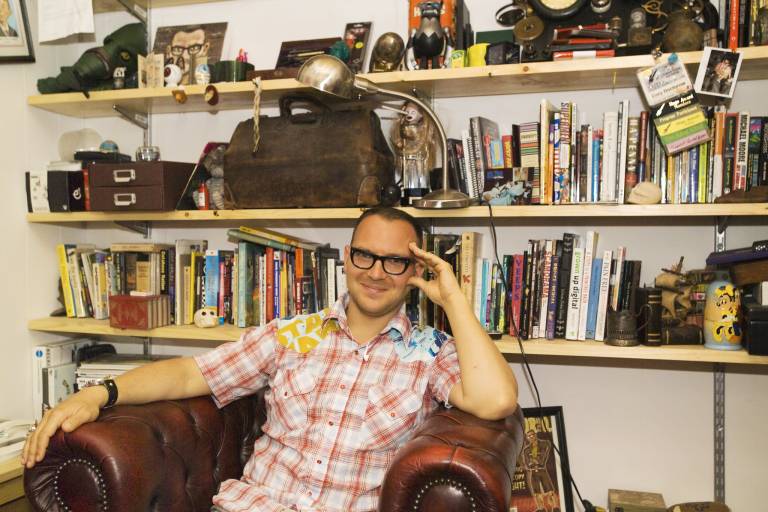Peter Kirstein Lecture 2023 featuring Cory Doctorow
01 June 2023, 2:00 pm–4:00 pm

Join us for the 4th edition of the annual Peter Kirstein Lecture Series, featuring Science Fiction author, activist, and journalist, Cory Doctorow. The lecture and Q&A will be followed by a reception and book signing.
This event is free.
Event Information
Open to
- All
Cost
- Free
Organiser
-
Computer Science – UCL
Location
-
Lecture Theatre 1Gower StreetLondonWC1E 6BT
Cory Doctorow: Seize The Means of Computation: A Big Tech Disassembly Manual
We're paying way too much attention to making Big Tech better, and not nearly enough attention to making it *smaller*. After all, nobody's perfect - especially a multinational corporation hoping to craft speech rules governing 3 billion people speaking 1,000 languages in 100 countries - and that means that giant services are bound to make colossal mistakes with stupendous consequences.
Making Big Tech smaller starts with making it easier to leave. Interoperability is the techbuster's secret weapon. With interop, uses can leave Facebook without cutting ties to the people who stay; or switch mobile OSes without losing their apps, data and media; or change e-readers without losing their books.
Big Tech isn't going to give us interoperability - we have to take it. Crafting regulations that Big Tech can't cheat on is hard - harder still is making policies that new kinds of tech services - small businesses, co-ops, nonprofits - can also comply with.
It's hard, but it's not impossible. What is impossible though, is making Big Tech fix itself. The answer to the machine is never the machine. Rules forcing Big Tech to police its users can only work if Big Tech never gets too small to do that policing.
Interoperability is tech liberation's secret weapon, the key to technological self-determination and a better future. We don't need better Zucks and Musks - we need to abolish them!
Cory will offer his insights into these questions based on his diverse career working as a science fiction author, activist, and journalist.
This is a hybrid event. It takes place at UCL and will also be live streamed. The lecture is followed by a sparkling afternoon tea reception and book signing.
Register for Peter Kirstein Lecture with Cory Doctorow
About the speaker: Cory Doctorow
Cory Doctorow (craphound.com) is a science fiction author, activist, and journalist. His latest book is Chokepoint Capitialism (with Rebecca Giblin) nonfiction about creative labor markets and monopoly.
His latest novel is Attack Surface, a standalone adult sequel to Little Brother. He is also the author How to Destroy Surveillance Capitalism, nonfiction about conspiracies and monopolies; and of Radicalized and Walkaway, science fiction for adults, a YA graphic novel called In Real Life; and young adult novels like Homeland, Pirate Cinema and Little Brother. His first picture book was Poesy the Monster Slayer (Aug 2020).
In 2023/4, Tor Books will publish two more science fiction novels for adults: Red Team Blues and The Lost Cause; and Verso will publish The Internet Con, a nonfiction book about monopoly and radical interoperability.
He maintains a daily blog at Pluralistic.net. He works for the Electronic Frontier Foundation, is a MIT Media Lab Research Affiliate, is a Visiting Professor of Computer Science at Open University, a Visiting Professor of Practice at the University of North Carolina’s School of Library and Information Science and co-founded the UK Open Rights Group.
Born in Toronto, Canada, he now lives in Los Angeles. In 2020, he was inducted into the Canadian Science Fiction and Fantasy Hall of Fame.
About Peter Kirstein
The Peter Kirstein lecture is the flagship lecture for the Department of Computer Science at UCL. It was so named to honour the life and work of Peter Kirstein, the founding head of UCL Computer Science and a major figure in the development of the field of Computer Science globally.
Peter was a visionary who pushed at the boundaries of what we knew and what we could do, often in the face of disapproval and difficulties from more conservative voices. As a result, he was instrumental in changing the nature of society, not just in the ‘developed’ world, but in countries working to establish themselves following the collapse of the Soviet Union, amongst others.
 Close
Close

